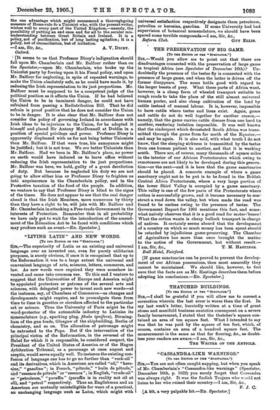SIR, —The superiority of Latin as an existing and universal language
over an invented one, even for purely utilitarian purposes, is surely obvious, if once it is recognised that up to the Reformation it was to a large extent the universal and convenient language of arts, sciences, letters, commerce, and la,iv. As new words were required they were somehow in- vented and came into common use. To this end I venture to suggest that the Universities of Europe and America might be appointed protectors or patrons of the several arts and sciences, with delegated power to invent such new words—at the instance, say, of Chambers of Commerce—as changes and developments might require, and to promulgate them from time to time in gazettes or circulars affected to the particular art or science. Thus the University of Paris might be the word-protector of the automobile industry to Latinise its nomenclature (e.g., sparking plug, fibula ignifera), Birming- ham of the gun trade, Glasgow of the shipbuilding, Berlin of chemistry, and so on. The allocation of patronage might be entrusted to the Pope. But if the intervention of the Principal victim of the Reformation, in the reversal of the Babel for which it is responsible, be considered suspect, the President of the United States of America or of the Hague Arbitration Tribunal, as a personage at once august and aseptic, would serve equally well. To instance the existing con- fusion of language one has to go no further than "rock-oil " and its derivatives, which in American are called "oil," "kero- sine," " gasoline"; in French, " petrole," " huile de petrole," and "essence de petrole" or "essence "; in English, "crude oil" or "petroleum," "paraffin" (paraffin is in reality not oil at all), and " petrol " respectively. Thus an Englishman and an American are mutually unintelligible for want of a practical, an unchanging language such as Latin, which might with
universal satisfaction respectively designate them petroleum, petrolina or kerosina, gasolina. If some University had had supervision of botanical nomenclature, we should have been spared some terrible compounds.—I am, Sir, &a.,
Reform Club. GUY Ems.






































 Previous page
Previous page